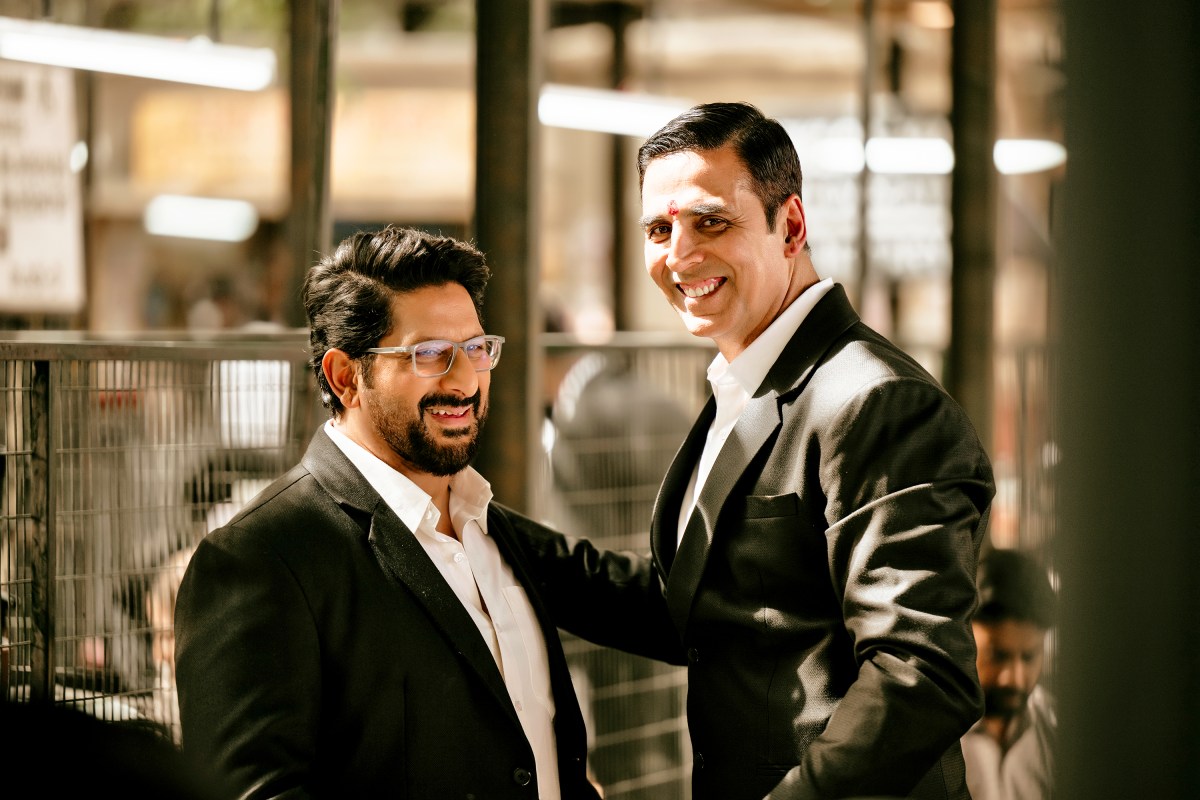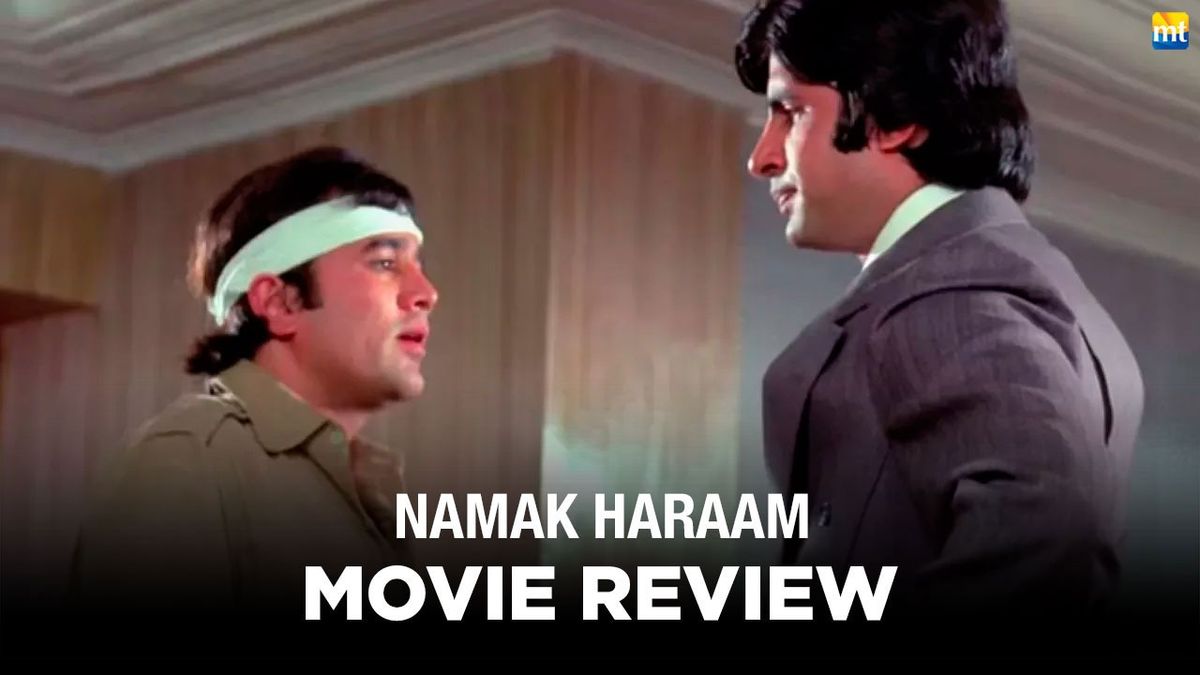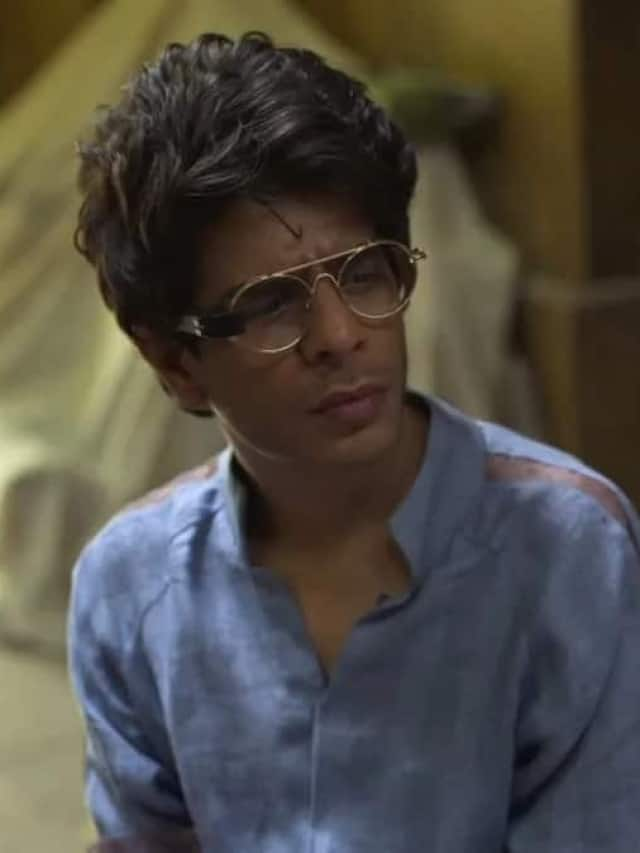
‘Jolly’ good lawyers, a jolly good film – Beyond Bollywood
Loosely inspired by the 2011 land acquisition case in Bhatta–Parsaul, Subhash Kapoor’s courtroom comedy blends humour with insight. Akshay Kumar, Arshad Warsi and Saurabh Shukla lead the charge for justice with wit and conviction.
Rating: ⭐️⭐️⭐️ ( 3/ 5)
By Mayur Lookhar
Franchise fatigue often demands change, but it’s rare to see it play out in the second film itself. Arshad Warsi won praise for Jolly LLB (2013), yet four years later he was replaced by superstar Akshay Kumar in Jolly LLB 2, not a sequel, but a standalone story with a different Jolly. It was hard not to feel a sting at that switch. Eight years on, series creator Subhash Kapoor pulls off the unthinkable by bringing both Jollys together, cleverly weaving in Jagdish Tyagi, and perhaps even Warsi’s own frustration at being sidelined.
Story
Jagdishwar ‘Jolly’ Mishra vs. Jagdish ‘Jolly’ Tyagi, this is the legal clash, rather legal kalesh audiences have been waiting for. Both practice in Delhi and first cross swords on the court premises. Sharing the same nickname, they often face mix-ups, with clients meant for Tyagi (Arshad Warsi) ending up at Mishra’s (Akshay Kumar) cramped cabin, much to Tyagi’s irritation. Their real showdown begins when Tyagi reluctantly takes up the petition of protesting villagers from Parsaul, accusing their local sahukar (moneylender) of colluding with a corporate giant to grab their land. And not just any giant, the country’s biggest tycoon, Haribhai Khaitan (Gajraj Rao). Rather surprisingly, Khaitan’s team chooses the relatively unknown Mishra to defend him, pitting both Jollys against each other in a high-stakes courtroom battle. The initial battle feels like a foregone conclusion, but as uncomfortable truths surface, the two Jollys set aside rivalry and join forces for a larger cause.
Screenplay & Direction

The trailer cleverly positioned the story as a Jolly vs Jolly legal clash. At that point, one wondered, since this is a courtroom drama, someone has to lose. But would a superstar risk a defeat on screen? With the involvement of an NGO in the plot, it even seemed the film might take a dig at dubious NGO funding, with Arshad Warsi’s Jolly Tyagi conceding ground to Akshay Kumar’s Jolly Mishra.
Thankfully, those assumptions are laid to rest by the interval, when it becomes evident that this is, in fact, a genuine case of land grab. The film acknowledges that it takes inspiration from the 2011 Bhatta-Parsaul events, while clarifying that it is not directly based on them. The actual Bhatta-Parsaul villages are located in Dankaur, Gautam Buddha District, Noida, Uttar Pradesh. Subhash Kapoor, however, relocates the conflict to Bikaner, Rajasthan where Janki Rajaram Solanki (Seema Biswas) leads the fight on behalf of the aggrieved villagers. Her husband’s suicide, and later that of her daughter-in-law, underscore the devastating cost of the injustice.
In 2011, the Mayawati-led Bahujan Samaj Party government had copped criticism for alleged land grabbing. Director Kapoor plays it safe, by pinning the blame on a top fictitious business tycoon. Be it real or reel, our politicians often go scot-free. 14 years later, this film gives us a semblance of what transpired in Bhatta-Parsaul. The primary conflict speaks for itself, but this film subtly hints that maybe Formula 1 departing India wasn’t just all about higher entertainment tax. Mind you the Buddh Circuit was just a tiny piece in this whole imbroglio. The spark was acquisition by the Yamuna Expressway Industrial Development Authority (YEIDA) for the expressway corridor and real estate projects, not the circuit itself. In the film, the two Jollys ride their camel carts onto the racing track, though dramatic, the moment globalises a serious local grievance.
The Jolly LLB series is rooted in legal comedy, and one naturally expects Bollywood to dramatise courtroom proceedings. The first film struck the right chord, but with Jolly LLB 2, Kapoor seemed to go overboard, almost making a mockery of the profession. Escapism and suspension of disbelief are fine in fictional tales, but when the plot draws loosely from real cases, a filmmaker ought to tread carefully. In Jolly LLB 3, Kapoor plays it wise: the humour is measured, the land-grab issue is treated with respect, and the courtroom avoids unnecessary theatrics. The comical kalesh (tension) is limited to the previous cases involving Jolly Mishra and Jolly Tyagi.

For the first time, Kapoor seems to have researched the subject in depth, underlining its larger implications while carrying a subtle Jai Jawan, Jai Kisan undertone. More importantly, the courtroom theatrics are kept in check. Viewers like this reviewer can respect that restraint, but it raises a question: has Kapoor, in doing so, risked alienating the larger audience that thrives on escapism and enjoys mindless courtroom drama? To each their own, but we felt Kapoor delivers a balanced screenplay, one that blends the judiciary, activism, and just the right dose of humour.
Acting

Akshay Kumar is a superstar, but it’s only fitting that the first Jolly, Arshad Warsi, gets his due in Jolly LLB 3. They work as a tag team, with Warsi leading first, then passing the baton to Akshay Kumar, who does the hard yards before relaying it back to Warsi for the closing act (arguments). “Bas yahi hamara case hai.” These five words linger long, reminding us how convenient it is to displace the voiceless poor, while the privileged lot will never make personal sacrifices for the sake of economic development. Warsi’s grown in age, and may not be in the greatest of shape, but he’s never lost his comic timing. This legal (reel) kalesh with Akshay Kumar, an equally gifted actor, naturally makes for fun conversations. By the end, both Jolly Tyagi and Jolly Mishra gain each other’s respect and entertain the audience.
Jolly LLB 3 is all about keeping things in balance, and that extends to Akshay Kumar, who doesn’t go overboard with his trademark humour. Beyond the drama and comedy, the film also strikes a chord with the legal community, especially the countless humble lawyers and the economic as well as social challenges they face. You don’t need to venture into small towns, just step into the premises of any court and its surroundings. You’ll find tiny cubicles with advocates yearning for clients, often soliciting from the court premises itself. Overjoyed when 40 Parsaul villagers crowd into his cubicle, Jolly Mishra instructs his understudy to quickly fetch stamp papers, only to realise that this poor lot has nothing to offer. He’s wasted his time and money on the papers.

The Subhash Kapoor directorial also shines a light on elite advocates who earn millions defending influential corporates. “Ah, you’re generalising,” the top legal eagles might protest, and they’d have a point. Still, cinema cannot be summoned to answer for morality. Yet, the film itself carries an irony. Fathom this: Jolly Mishra’s very first case involves defending a young woman accused by her 80-year-old husband and his family of lying about her true gender. When the skeletons tumble out, you’re stunned to discover that this woman, Shashi Bala (Abhishant Rana), is actually a man running a racket of duping lonely old men, and having Jolly Mishra’s blessings. So, for a lawyer who shows no remorse in defending a fraud like Shashi Bala, Mishra’s sudden moral awakening in the Bikaner land-grab case comes as a surprise. Yes, Janki Devi has suffered insurmountable personal loss, but is (old man) Lalaji’s grievance any less?
The bulk of the humour spills out of the courtroom, with Saurabh Shukla’s Justice Sunder Lal Tripathi often at the centre of it. He blames Jolly Tyagi for his first heart attack, then Jolly Mishra for the second, which sadly led to his wife’s passing. Eight years later, Justice Tripathi isn’t sulking over his whiskey; he’s happily exploring love on dating apps. One wonders whether Harish Salve was an inspiration. He’s making efforts, or at least claiming to follow a healthy lifestyle. He becomes smitten with Haryanvi SHO Chanchal Chautala (Shilpa Shukla) and frequently drops by her station, ostensibly reporting petty thefts. Eventually, he blurts out, “My heart, too, is stolen,” and proposes a Valentine’s Day date, which the officer accepts. Unfortunately for Justice Tripathi, the two Jollys turn up uninvited and ruin the evening. Though a pain for Tripathi, this trio together also delivers plenty of guffaws.

Justice Tripathi, however, never lets humour compromise his judgment. In a pivotal scene, a court staffer is puzzled as to why he adjourned the court when he could have delivered the order that very day. The staffer wonders if it is partiality, to which the wise justice replies, “No, I’m just trying to give another chance for the truth to emerge.” Shukla delivers a brilliant performance, blending humour with wisdom effortlessly.
Gajraj Rao’s Haribhai Khaitan offers wisdom as well. In his opening scene, while giving a leadership talk, the business tycoon challenges the age-old notion that the rich are morally corrupt while the poor are inherently noble. Recognition is reserved for soldiers, politicians, and film stars, he notes, yet businessmen are often cast as villains in the public eye. Khaitan appeals to both the people and the government to strengthen the business community, arguing that they can play a vital role in eradicating poverty. Rao’s hairdo feels slightly out of place, and it’s a bit baffling to see the country’s top tycoon lose his cool at the end. Still, Rao delivers a fairly compelling performance.
A word of praise for Ram Kapoor, too, who plays Khaitan’s elite defence attorney. He couldn’t take up the businessman’s case earlier, as he was busy in London trying to secure bail for an absconding, flamboyant Indian businessman named VM.
Amrita Rao has been away from the screen for some time and would be pleased to get her fair share of screentime in her return to the franchise. Like in Jolly LLB 2, Huma Qureshi’s Pushpa Pandey is more than just Jolly Mishra’s wife. Yes, she enjoys her whisky, but she is often the first to caution her husband against crossing moral boundaries.
For a woman who has lost her husband, land, and daughter-in-law, Seema Biswas’ Janki Solanki appears well-fed and largely unemotional until the final order is read. It’s striking, and somewhat bizarre, how both Janki and even Jolly Tyagi appear in court with their wounds still fresh.
Music / Technical Aspects
With a runtime of 157 minutes and grappling with the serious issue of land grabbing, it was wise not to include any songs in the film. Jolly LLB 3, however, is visually appealing, thanks to Rangarajan Ramabadran’s cinematography.
Final Word
Though successful, Jolly LLB 2 (2017) was disappointing. Subhash Kapoor certainly makes amends with Jolly LLB 3, not just by bringing the two Jollys together, but also through creative storytelling and meaningful social messaging. The first film perhaps offered a subtle reference to the famous hit-and-run case. The second exposed terror, yet saved an innocent Kashmiri from the gallows. The third tackles land grabbing, loosely based on the 2011 Bhatta-Parsaul cases. Kapoor seems to have his heart in the right place. If he is considering a fourth film, he could explore the little controversy over poor compensation in Ayodhya.
Watch the video review below.
Publisher: Source link



